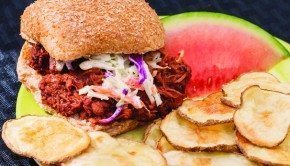VEGGIE NATION REVOLUTION
In 1776, the stirring phrase in the U.S. Declaration of Independence—life, liberty and the pursuit of happiness—became a rallying cry for American colonists seeking these inalienable rights of self-government. In 2015, those seeking a new way of eating for personal wellness, a more vibrant local economy and a healthier environment are fomenting their own kind of rebellion.
“You have to make a conscious decision to change for your own well-being, that of your family and your country,” according to former President Bill Clinton. In early 2010, suffering from heart disease, Clinton chose to radically change his meat-lover’s diet to a more plant-based focus. “I wanted to live to be a grandfather, so I decided to pick the diet that I thought would maximize my chances of long-term survival,” he says.
Clinton is part of a growing leadership group that espouses a more vegetarian approach to eating, including a federally appointed panel of nutritionists. For the first time since its formation in 1983, the federal Dietary Guidelines Advisory Committee this year elected to factor environmental sustainability into its recommendations, noting that a diet lower in animal-based foods is not only healthier, but has less of an environmental impact. The impetus toward plant-based foods is also stronger than in their last report in 2010.
Exciting Developments
A bold pioneer in the charge for plant-based eating is PlantPure Nation, a grassroots organization founded by Dr. T. Colin Campbell, Ph.D., the author of the bestselling The China Study, a book that helped persuade Clinton to make his own dietary change. Today, his son, Nelson Campbell, is at the forefront of this food revolution, most recently producing the independent documentary film PlantPure Nation, set to debut nationwide on July 4.
Those enticed by the delicious concept of better health for themselves and the planet can also turn to The PlantPure Nation Cookbook, with more than 150 plant-based recipes by Kim Campbell, Nelson’s wife, whom he names “the chef in the family.”
“No issue is bigger than the one of plant-based nutrition,” says Nelson. “It’s at the root of our healthcare crisis, affecting the lives of millions of Americans, the vitality of our economy and the solvency of our government. The food we eat has enormous effects on climate, water and soil resources. Our food choices also affect the way in which food is produced and distributed in this country, equitably or not.”
Historically, political revolutions tend to be violently adversarial, but a food revolution can take a more nurturing and inclusive course. “The first step people can take is to change their own diet,” Nelson says. “The next step is to help others do the same. The third is to get involved in the movement.”
New Fourth of July Barbecue
A fun way to help ourselves and our friends and family consider making dietary changes is hosting a plant-based Fourth of July get-together. Kim’s recipes for a smoky “barbecue” sandwich, creamy potato salad and a zesty, colorful bean dish celebrate traditional picnic foods with a twist. They’re also perfect for potluck-style entertaining.
“We have often branded this idea of plant-based nutrition as such and such a ‘diet’, and then built these brands around personalities. But in order to make this a more mainstream idea, we need to frame it differently. This concept of plant-based nutrition is a fact of nature; a simple idea that’s accessible to all,” says Nelson.
In a 2012 Gallup poll, just 5 percent of U.S. adults identified themselves as vegetarians, plus 2 percent as vegans. It’s a start, Nelson contends, and there are other promising signs. “The local-food movement is blossoming, with farmers’ markets springing up all over the United States,” proclaims the National Geographic special publication The Future of Food (Food.NationalGeographic.com). The number has increased dramatically in the past five years. The editors point to the demand for fresh produce and a desire to invest in local economies as driving this growth.
“I love the idea of a movement involving millions of people fixing a problem that industry and government have largely caused,” says Nelson. “Our success may show a new way forward for solving other pressing social problems.”
Judith Fertig blogs at AlfrescoFoodAndLifestyle.blogspot.com from Overland Park, KS.


























